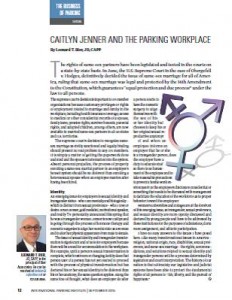The rights of same-sex partners have been legislated and tested in the courts on a state-by-state basis. In June, the U.S. Supreme Court in the case of Obergefell v. Hodges, definitively decided the issue of same-sex marriage for all of America, ruling that same-sex marriage was legal and protected by the 14th Amendment to the Constitution, which guarantees “equal protection and due process” under the law to all persons.
The Supreme Court’s decision is important to IPI member organizations because customary privileges or rights of employment related to marriage and family in the workplace, including health insurance coverage, access to medical or other confidential records of a spouse, family leave, pension rights, survivor benefits, parental rights, and adopted children, among others, are now available to married same-sex partners in all 50 states and U.S. territories.
The Supreme Court’s decision to recognize same-sex marriage as civilly sanctioned and legally binding should present no real problem to any IPI members. It is simply a matter of getting the paperwork done and filed and the spouse’s information into the system. Absent personal prejudice, the process of properly enrolling a same-sex marital partner in an employer’s benefit system should be no different than enrolling a heterosexual spouse when an employee marries after having been hired.
Identity
An emerging issue for employers is sexual identity and transgender status—who I am mentally and biologically—which is distinct from sexual preference—who I love or desire. Bruce Jenner, gold medalist, motivational speaker, and reality TV personality announced this spring that he was a transgender woman. Jenner is now Caitlyn and is going through the process of hormone therapy and cosmetic surgeries to align her mental state as a woman and to alter her physical appearance from male to female.
The issue of sexual identity and transgender transformation is significant and of note for employers because there will be a need for accommodation in the workplace. For example, until a person’s sexual transformation is complete, which restroom or changing facility does that person use? If a person has not yet elected to proceed with the process of physical transformation but has declared his or her sexual identity to be different than his or her anatomy, the same question applies. Along the same line of thought, what does an employer do after a person elects to have the cosmetic surgery to align themselves with the sex of his or her identity but chooses to keep his or her original sexual reproductive anatomy?
If and when an employee informs an employer that he or she is a transgender person, does the employer have a duty to educate staff so there is no harassment of the employee and to take reasonable precautions to prevent a hostile work environment? Is the employee’s disclosure confidential or something that needs to be discussed with management to facilitate the education of the workforce as to proper behavior toward the employee?
Women’s universities and colleges are at the forefront of this emerging issue, as transgender, sexual preference, and sexual identity are more openly discussed and declared by young people and have to be addressed by these institutions for the purposes of admissions, dorm room assignment, and athletic participation.
I have no easy answers to the issues I have posed here. Like many transformational issues in America—
religion, national origin, race, disabilities, sexual preference, and same-sex marriage—the rights, accommodations, and solutions related to sexual identity and transgender persons will be a process determined by legislation and court interpretation. The history of our nation is that ultimately our legislative and judicial systems have been able to protect the fundamental rights of all persons to “life, liberty, and the pursuit of happiness.”
Leonard T. Bier, JD, CAPP, is the principal of Bier Associates. He can be reached at lenbier@optonline.net or 732.828.8864.
TPP-2015-09-Caitlyn Jenner and the Parking Workplace

